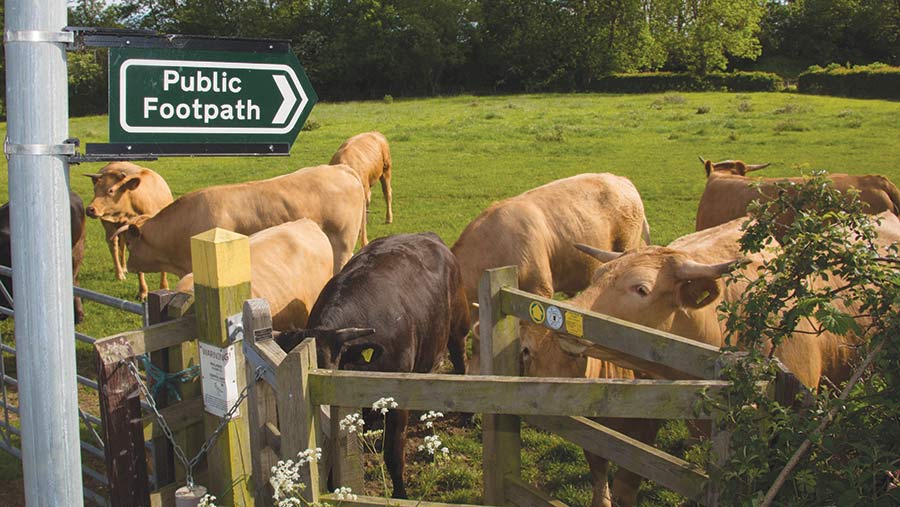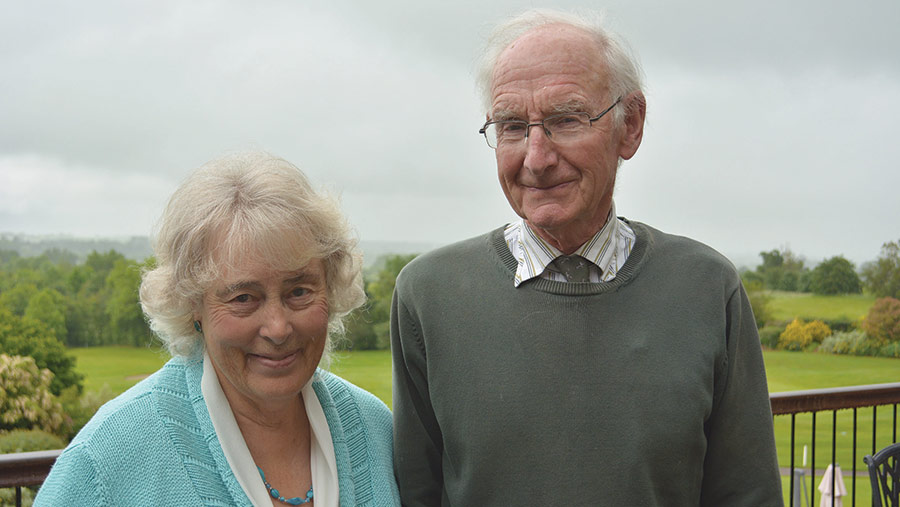How new footpaths scheme will help prevent cattle attacks
 © Tim Scrivener
© Tim Scrivener A scheme that aims to reduce the risk of fatal accidents involving ramblers and livestock aims to be rolled out across south-west England.
Cattle attacks on walkers have resulted in serious injury and death, with recent cases costing farmers and livestock owners thousands of pounds in legal fees and fines.
Ramblers with dogs in fields of cows with calves at foot are particularly at risk.
Farmers have no power to close footpaths giving walkers a right of way through fields of cattle. But now a scheme by Cornwall Council is seeing signs erected giving ramblers the choice of using an alternative route.
Linda Holloway, a senior enforcement officer for the local authority, has been investigating the issue around cattle and countryside access for years and looking at ways to reduce serious incidents.
See also: Tips on staying legal with bulls and cows near footpaths
Risk assessments
“Cornwall has the third highest density of cattle in the country,” she says, with only Yorkshire and Devon higher. “This year, we have already seen seven incidents. Five have involved major injuries, although not all of them have been officially reported.”
Not all farmers are aware of incidents – especially when cattle are in fields away from the home farm, says Ms Holloway.
When an incident is reported to the local authority – whether it is a near miss or involves an injury – the authority writes to the farmer asking them to make sure a risk assessment is in place.
Lack of a risk assessment has cost farmers lots of money in court cases brought after cattle have attacked members of the public.
It is all about changing the thought process when deciding whether to put cattle into a field with public access, Ms Holloway explains.
But a livestock farmer can be prosecuted for not having one if an incident happens and the Health and Safety Executive (HSE) takes action.
Alternative route signs
When an incident is reported, the council also advises farmers to move cattle from the field where it happened.
But Ms Holloway says that it is the farmer’s choice whether or not to do this – and some farmers have footpaths running through all their fields.
Farmers have the option of erecting signs giving ramblers the choice of bypassing fields with cattle by using an alternative route.
Ramblers are under no obligation to use the alternative route – because they have a right of way – but many choose to do so.
“What we are doing is not rocket science – it is about minimising the risk and giving people a choice,” says Ms Holloway.
“It is also about helping support the livestock owners when they have huge pressure from the public on their land. It helps them sleep at night.”
Further rollout
The council devised the scheme following input from a working group involving local representatives the British Horse Society, the HSE, the Ramblers Association, the Country Land and Business Association and the NFU.
It has been endorsed by John Porter, a retired agronomist who suffered a collapsed lung and seven broken ribs when he was attacked by a herd of cows while out walking with his brother Mike, who was killed in the same incident (see case study below).
Other local authorities are now considering introducing their own schemes. The idea was discussed at a meeting earlier this summer with representatives from neighbouring counties, including Bath and north-east Somerset, Dorset and Wiltshire.
The law
Livestock producers have a responsibility for the safety of people using public rights of way across their land.
In particular, farmers who keep animals in fields crossed by public rights of way may face civil or criminal proceedings if members of the public are injured by their livestock.
This can result in a criminal record, fines and sometimes a custodial sentence.
“If you are aware that particular animals are likely to be upset by people walking in their field, or are likely to behave aggressively towards people, then you should consider whether they should be in a place with public access – or one where walkers are known to stray,” says the NFU.
The Country Land and Business Association (CLA) has called for landowners and local authorities to be given the power to put in place temporary diversions of public footpaths and bridleways to reduce the risk of harm when land is being used for grazing.
CLA legal adviser Andrew Gillett said: “Diverting footpaths temporarily is a common-sense measure that could make a major difference for farmers and the general public. We will continue to press for this to be available as an option where the risk of harm is apparent.
“We want people to be able to enjoy the countryside, especially dog walkers, but it is vital that people and animals are kept safe.”
For HSE guidance on managing the risks to walkers and members of the public from cattle, download the HSE’s guide on Cattle and public access in England (PDF).
Case study: Farmer whose cows killed rambler must pay £30,000

Mary and John Porter
A former agronomist escaped from a herd of cows which attacked and killed his brother while the pair were walking together through a field in Wiltshire.
John Porter and his brother Mike were walking on a public footpath where cows were grazing with their calves at Turleigh, near Bradford-on-Avon. Both were walking dogs on leads when they were attacked by the herd of Limousin cross continental cows.
Mike, a 66-year-old retired university professor from Edinburgh, suffered fatal internal injuries caused by cattle trampling him. His elder brother, John, suffered multiple rib fractures, a punctured lung and concussion, but survived.
The cattle had previously attacked four members of the public in the five years before the fatal incident in 2013. Swindon Court was told that the cattle may have attacked the walkers because they perceived a risk to their calves from the men and their dogs.
A Health and Safety Executive investigation found that the farmer had not taken reasonable precautions to protect people from his cattle while using the footpaths. He was given a 12-month prison sentence suspended for two years and ordered to pay £30,000 costs.
Mr Porter, who is campaigning for safer footpaths, can be contacted at: jdp.crossways@uwclub.net.
